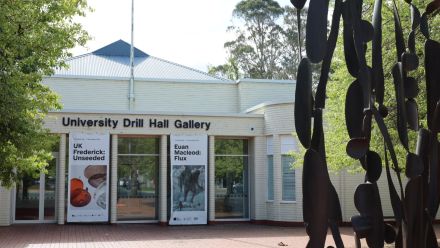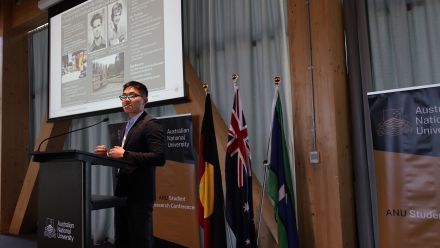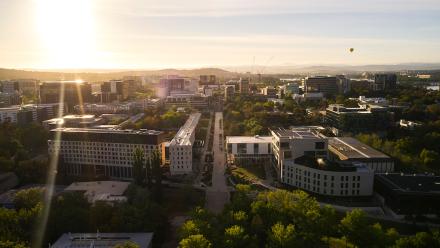ANU Spaces - Jessa Rogers
Meet Jessa Rogers, a PhD candidate researching the socio-emotional wellbeing of Indigenous students.
Jessa, what does your study involve?
Currently I'm researching the history of boarding schools for Indigenous students, primarily for Maori students in New Zealand and in Australia for Aboriginal students. I am exploring the effect of boarding on the social, emotional and cultural wellbeing of students, looking at their experiences as well as those of their families, communities, and Elders.
What is your favourite spot on campus?
My favourite spot on campus is the Tjabal Centre, because I love connecting and yarning with Aunty Anne, the other staff and especially the Indigenous undergrads, some of whom I taught in the course I tutor in the Indigenous Studies major at CAEPR.
There is a great community here in Canberra, and at the ANU. Aunty Anne often cooks for us which is always delicious too. It's a safe and comfortable space that reminds me of home (Queensland) where I grew up. The atmosphere and family/community love that is there keeps me going when I miss my community on the Sunshine Coast.
If you were free for an afternoon, you would...
At the moment I would be reading papers. But if I truly had time off, I would be with my loved ones, preferably outdoors and away from the city. I also love art so if I can't get away I will often go to a gallery and enjoy the artwork there.
Can you tell us how you decided to study Indigenous education?
I was lucky enough to receive a scholarship but had a difficult time as a year 12 student. It was my teachers who inspired and assisted me to continue with my education and to achieve the results I did.
I also knew for my community that education is the key to better outcomes for Aboriginal people. So I chose teaching as my career and after a few years of teaching moved into higher education, lecturing pre-service teachers about Indigenous education.
What is your inspiration in conducting your research?
I coordinated an Indigenous student program in a girls boarding school in Brisbane for several years. The relationships I formed with my students and their families inspire me the most. Both the successes, and the failures, continue to inspire me each and every day.
What would you like to see improved, when it comes to Indigenous education? Is Australia doing enough to help Indigenous children get the best education they deserve?
Indigenous education is such a broad field. I am currently writing a chapter for a book with Cambridge University Press about this topic and have broken it into who we teach, what we teach and how we teach.
What that means is, we must know more as teachers about the history of this country, how our students have been affected by past policies and discriminatory practices in this country. But we also need to know more about our unique, diverse and vibrant cultures and what they look like in different parts of this country. Every Aboriginal person looks and lives differently. We are connected by our histories and cultures but we are also unique individuals.
When I say we need to look at what we teach, Indigenous perspectives need embedding in all levels of education. We are the First Peoples of this land, and so all Australians should have the opportunity to learn about our cultures and histories in meaningful ways threaded through all education, not as one-off or stand-alone experiences.
How we teach comes back to who we are as teachers. What are our own beliefs, biases and worldviews? These will impact how we teach, what we teach and how we treat our students. There is no silver bullet. It's all about relationships with our students and their families, and knowing our own strengths and weaknesses as teachers.
If you had a message you wanted to give to our politicians on improving Indigenous education, what would the message be?
Politicians need to spend more time talking to Indigenous teachers in the field. I work with MATSITI (More Aboriginal and Torres Strait Islander Teachers Initiative) and have been heavily involved in Reconciliation Australia's Schools Program (Narragunnawali). Such programs could inform policy through grassroots understandings of the real issues and also successes that are happening in Indigenous Education. For example, I heard the other day that New South Wales just employed its 1000th Indigenous teacher. What a success.
Politicians sitting in Canberra churning out policies about what happens in remote communities are too far removed from the realities of Indigenous education. They need to draw on the knowledge of those who have dedicated their lives, and in turn had their lives enriched by, teaching our special and precious Indigenous students. It's been my passion and the best experience I've had in my professional career to date.


